2022年中考英语语法二轮专题复习--名词课件(共17张PPT)
文档属性
| 名称 | 2022年中考英语语法二轮专题复习--名词课件(共17张PPT) | 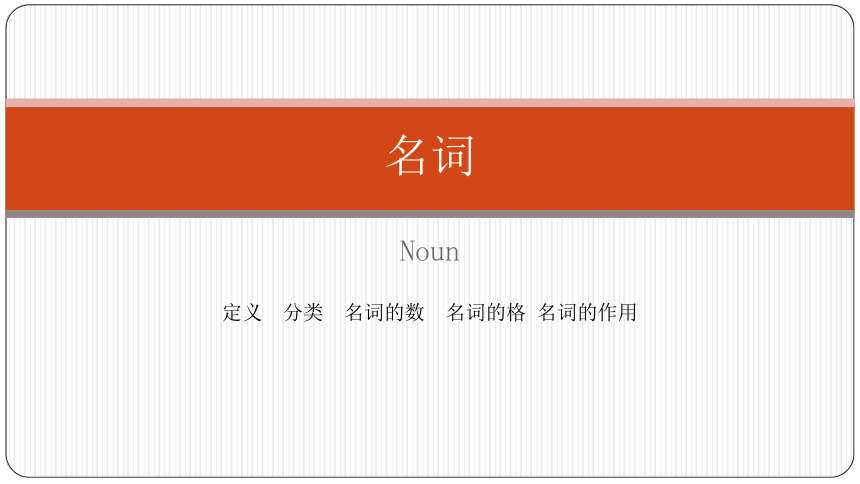 | |
| 格式 | zip | ||
| 文件大小 | 72.4KB | ||
| 资源类型 | 教案 | ||
| 版本资源 | 通用版 | ||
| 科目 | 英语 | ||
| 更新时间 | 2022-02-19 18:27:42 | ||
图片预览

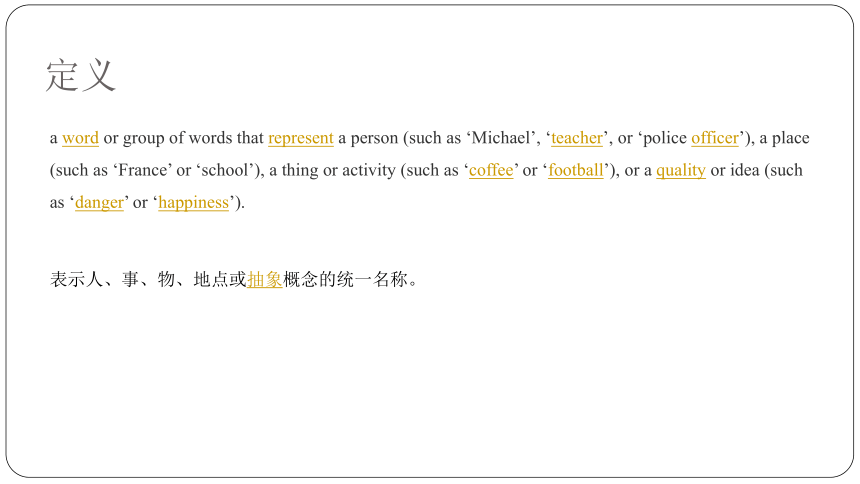
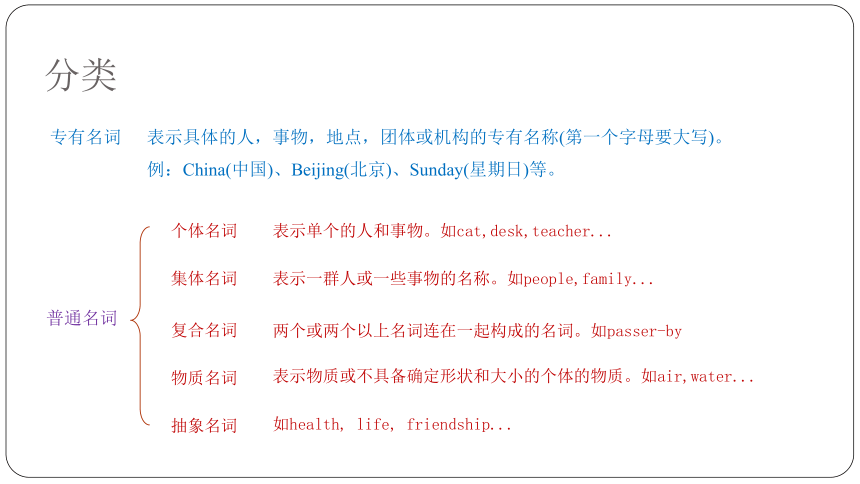
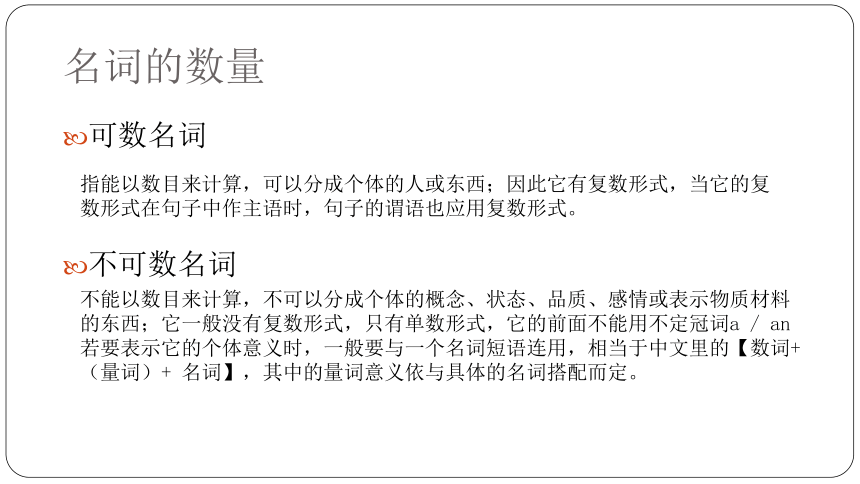
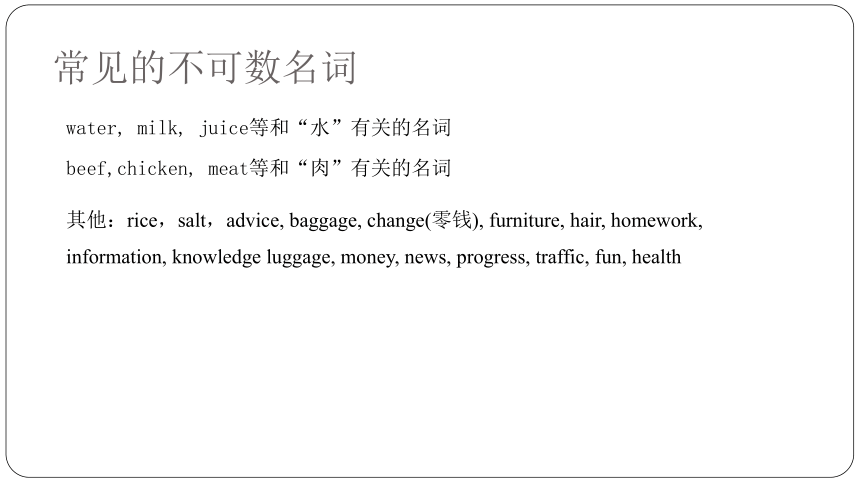
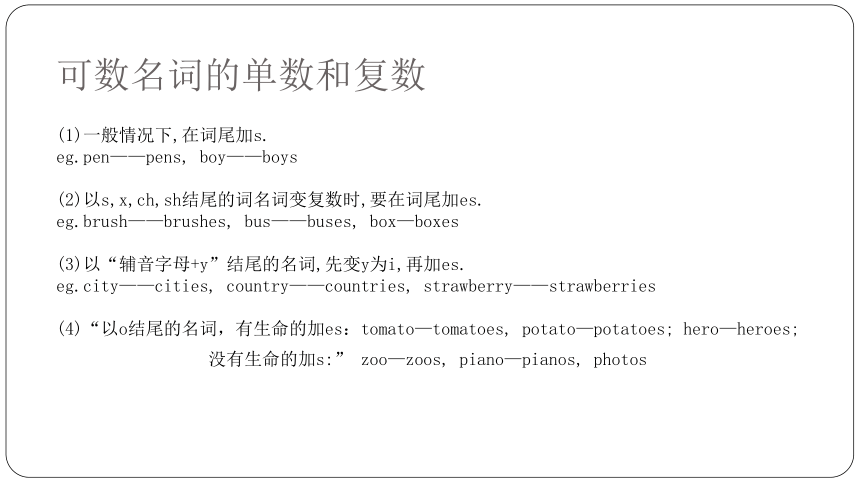
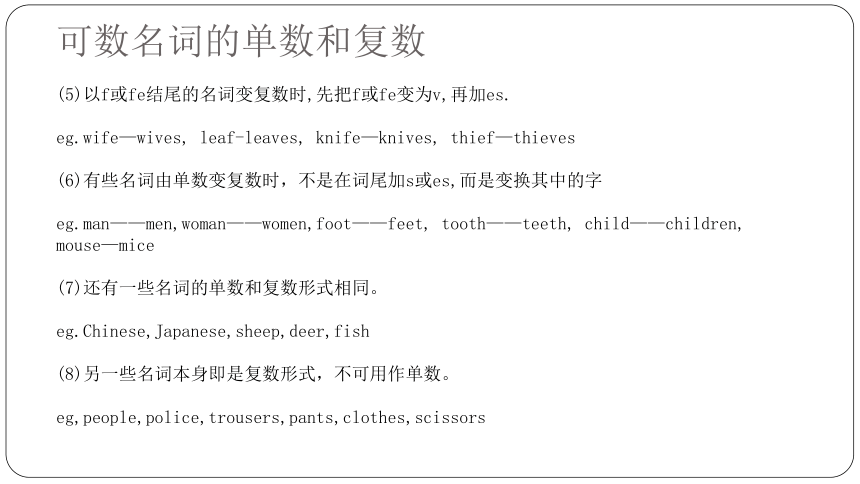
文档简介
(共17张PPT)
Noun
名词
定义 分类 名词的数 名词的格 名词的作用
定义
a word or group of words that represent a person (such as ‘Michael’, ‘teacher’, or ‘police officer’), a place (such as ‘France’ or ‘school’), a thing or activity (such as ‘coffee’ or ‘football’), or a quality or idea (such as ‘danger’ or ‘happiness’).
表示人、事、物、地点或抽象概念的统一名称。
分类
专有名词
普通名词
表示具体的人,事物,地点,团体或机构的专有名称(第一个字母要大写)。
例:China(中国)、Beijing(北京)、Sunday(星期日)等。
个体名词
集体名词
复合名词
物质名词
抽象名词
表示单个的人和事物。如cat,desk,teacher...
表示一群人或一些事物的名称。如people,family...
两个或两个以上名词连在一起构成的名词。如passer-by
表示物质或不具备确定形状和大小的个体的物质。如air,water...
如health, life, friendship...
名词的数量
可数名词
不可数名词
指能以数目来计算,可以分成个体的人或东西;因此它有复数形式,当它的复数形式在句子中作主语时,句子的谓语也应用复数形式。
不能以数目来计算,不可以分成个体的概念、状态、品质、感情或表示物质材料
的东西;它一般没有复数形式,只有单数形式,它的前面不能用不定冠词a / an
若要表示它的个体意义时,一般要与一个名词短语连用,相当于中文里的【数词+
(量词)+ 名词】,其中的量词意义依与具体的名词搭配而定。
常见的不可数名词
其他:rice,salt,advice, baggage, change(零钱), furniture, hair, homework, information, knowledge luggage, money, news, progress, traffic, fun, health
water, milk, juice等和“水”有关的名词
beef,chicken, meat等和“肉”有关的名词
可数名词的单数和复数
(1)一般情况下,在词尾加s.
eg.pen——pens, boy——boys
(2)以s,x,ch,sh结尾的词名词变复数时,要在词尾加es.
eg.brush——brushes, bus——buses, box—boxes
(3)以“辅音字母+y”结尾的名词,先变y为i,再加es.
eg.city——cities, country——countries, strawberry——strawberries
(4)“以o结尾的名词,有生命的加es:tomato—tomatoes, potato—potatoes; hero—heroes;
没有生命的加s:” zoo—zoos, piano—pianos, photos
(5)以f或fe结尾的名词变复数时,先把f或fe变为v,再加es.
eg.wife—wives, leaf-leaves, knife—knives, thief—thieves
(6)有些名词由单数变复数时,不是在词尾加s或es,而是变换其中的字
eg.man——men,woman——women,foot——feet, tooth——teeth, child——children,
mouse—mice
(7)还有一些名词的单数和复数形式相同。
eg.Chinese,Japanese,sheep,deer,fish
(8)另一些名词本身即是复数形式,不可用作单数。
eg,people,police,trousers,pants,clothes,scissors
可数名词的单数和复数
名词的所有格
①不是以s结尾的名词变成所有格时,在词尾加’s.
eg. Mike’s watch,Women’s Day
②以s结尾的名词变成所有格时,只加’.
eg. teachers’office, students’rooms
③两个或两个以上名词并列,表示共同所有,只需在最后一个名词后加’s.
eg. Tom and Mike’s room
④两个或两个以上名词并列,表示分别所有,需在几个名词后都加’s.
eg. Mary’s and Jenny’s bikes
⑤ 用of表示的所有格
eg. a map of China, the door of the room
双重所有格
a friend of mine。我朋友中其中一个朋友
two books of Maria’s。
some friends of my father’s。
表示所属事物中的其中一部分
名词的作用
作主语
作宾语
作表语
作补语
作定语
作状语
作同位语
作主语
The dog is eating bones.
My father often reads newspaper.
An accident happened.
作宾语
I often play basketball.
She gave me a book.(双宾语)
You should finish the task on time.
作表语
作表语一般在系动词be后.
I am a student.
You are my good friend.
作补语
作补语指的是宾语补语.
The parents cheated their son John.
We called him Little Duck.
作定语
作定语是作修饰的作用.
swimming pool.
air conditioning.
作状语
wait a moment.
next week.
in the morning.
作同位语
The girl, Sarah, is the best student.
Our teacher, Mr Fang, teaches us Englsih.
Marilyn Monroe, a famous movie star, committed suicide.
Noun
名词
定义 分类 名词的数 名词的格 名词的作用
定义
a word or group of words that represent a person (such as ‘Michael’, ‘teacher’, or ‘police officer’), a place (such as ‘France’ or ‘school’), a thing or activity (such as ‘coffee’ or ‘football’), or a quality or idea (such as ‘danger’ or ‘happiness’).
表示人、事、物、地点或抽象概念的统一名称。
分类
专有名词
普通名词
表示具体的人,事物,地点,团体或机构的专有名称(第一个字母要大写)。
例:China(中国)、Beijing(北京)、Sunday(星期日)等。
个体名词
集体名词
复合名词
物质名词
抽象名词
表示单个的人和事物。如cat,desk,teacher...
表示一群人或一些事物的名称。如people,family...
两个或两个以上名词连在一起构成的名词。如passer-by
表示物质或不具备确定形状和大小的个体的物质。如air,water...
如health, life, friendship...
名词的数量
可数名词
不可数名词
指能以数目来计算,可以分成个体的人或东西;因此它有复数形式,当它的复数形式在句子中作主语时,句子的谓语也应用复数形式。
不能以数目来计算,不可以分成个体的概念、状态、品质、感情或表示物质材料
的东西;它一般没有复数形式,只有单数形式,它的前面不能用不定冠词a / an
若要表示它的个体意义时,一般要与一个名词短语连用,相当于中文里的【数词+
(量词)+ 名词】,其中的量词意义依与具体的名词搭配而定。
常见的不可数名词
其他:rice,salt,advice, baggage, change(零钱), furniture, hair, homework, information, knowledge luggage, money, news, progress, traffic, fun, health
water, milk, juice等和“水”有关的名词
beef,chicken, meat等和“肉”有关的名词
可数名词的单数和复数
(1)一般情况下,在词尾加s.
eg.pen——pens, boy——boys
(2)以s,x,ch,sh结尾的词名词变复数时,要在词尾加es.
eg.brush——brushes, bus——buses, box—boxes
(3)以“辅音字母+y”结尾的名词,先变y为i,再加es.
eg.city——cities, country——countries, strawberry——strawberries
(4)“以o结尾的名词,有生命的加es:tomato—tomatoes, potato—potatoes; hero—heroes;
没有生命的加s:” zoo—zoos, piano—pianos, photos
(5)以f或fe结尾的名词变复数时,先把f或fe变为v,再加es.
eg.wife—wives, leaf-leaves, knife—knives, thief—thieves
(6)有些名词由单数变复数时,不是在词尾加s或es,而是变换其中的字
eg.man——men,woman——women,foot——feet, tooth——teeth, child——children,
mouse—mice
(7)还有一些名词的单数和复数形式相同。
eg.Chinese,Japanese,sheep,deer,fish
(8)另一些名词本身即是复数形式,不可用作单数。
eg,people,police,trousers,pants,clothes,scissors
可数名词的单数和复数
名词的所有格
①不是以s结尾的名词变成所有格时,在词尾加’s.
eg. Mike’s watch,Women’s Day
②以s结尾的名词变成所有格时,只加’.
eg. teachers’office, students’rooms
③两个或两个以上名词并列,表示共同所有,只需在最后一个名词后加’s.
eg. Tom and Mike’s room
④两个或两个以上名词并列,表示分别所有,需在几个名词后都加’s.
eg. Mary’s and Jenny’s bikes
⑤ 用of表示的所有格
eg. a map of China, the door of the room
双重所有格
a friend of mine。我朋友中其中一个朋友
two books of Maria’s。
some friends of my father’s。
表示所属事物中的其中一部分
名词的作用
作主语
作宾语
作表语
作补语
作定语
作状语
作同位语
作主语
The dog is eating bones.
My father often reads newspaper.
An accident happened.
作宾语
I often play basketball.
She gave me a book.(双宾语)
You should finish the task on time.
作表语
作表语一般在系动词be后.
I am a student.
You are my good friend.
作补语
作补语指的是宾语补语.
The parents cheated their son John.
We called him Little Duck.
作定语
作定语是作修饰的作用.
swimming pool.
air conditioning.
作状语
wait a moment.
next week.
in the morning.
作同位语
The girl, Sarah, is the best student.
Our teacher, Mr Fang, teaches us Englsih.
Marilyn Monroe, a famous movie star, committed suicide.
同课章节目录
- 词法
- 名词
- 动词和动词短语
- 动词语态
- 动词时态
- 助动词和情态动词
- 非谓语动词
- 冠词
- 代词
- 数词和量词
- 形容词副词及其比较等级
- 介词和介词短语
- 连词和感叹词
- 构词法
- 相似、相近词比较
- 句法
- 陈述句
- 一般疑问句和否定疑问句
- 特殊疑问句及选择疑问句
- 反意疑问句
- 存在句(There be句型)
- 宾语从句
- 定语从句
- 状语从句
- 主谓一致问题
- 简单句
- 并列句
- 复合句
- 主谓一致
- 主、表语从句
- 名词性从句
- 直接引语和间接引语
- 虚拟语气
- 感叹句
- 强调句
- 倒装句
- 祈使句
- 句子的成分
- 句子的分类
- 题型专区
- 单项选择部分
- 易错题
- 完形填空
- 阅读理解
- 词汇练习
- 听说训练
- 句型转换
- 补全对话
- 短文改错
- 翻译
- 书面表达
- 任务型阅读
- 语法填空
- 其他资料
